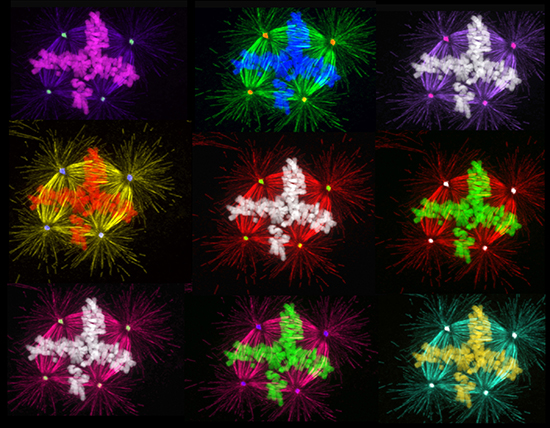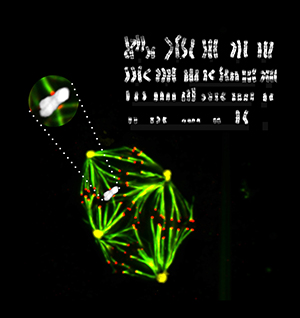Neil J. Ganem, an assistant professor of pharmacology and medicine at the School of Medicine, has won the prestigious Searle Scholar award for his research on genomic instability in cancer cells. His innovative work increases the understanding of cancer cell division, potentially leading to new avenues of treatment.
Ganem is the first person from BU to receive the Searle award, given to assistant professors judged to be among the country’s most promising young researchers in the chemical and biological sciences, and one of only 15 winners nationwide in 2015. Ganem and the other winners will each receive $300,000 in flexible funding over three years.
“The Searle award validates our view that Dr. Ganem’s research will continue to make great contributions to the area of cancer biology and, most important, to understanding the basic mechanisms of the disease,” says David H. Farb, who is chair of the MED department of pharmacology and experimental therapeutics and who recruited Ganem to the school in 2013. “Every so often there’s a person who has a unique approach to the problem. Neil is one such person.”

A single cancer cell (shown in various colors) undergoing multipolar cell division. This type of abnormal cell division promotes chromosome missegregation and aneuploidy. Image courtesy of Neil Ganem
The Searle Scholars were chosen by a panel of senior scientists from a pool of 186 finalists nominated by 126 universities and research institutions. “We are delighted that Dr. Ganem has been named a Searle Scholar, one of the most prestigious and competitive new investigator awards,” says Karen Antman, dean of MED and provost of the Medical Campus. “We thank the Searle Scholars Program for this award, which will further support Dr. Ganem’s research on how cancer cells adapt to abnormal chromosomal content.”
“I’m a bit shocked, but also very proud,” says Ganem, who earned a PhD from Dartmouth College’s Geisel School of Medicine and was a postdoctoral fellow at the Dana-Farber Cancer Institute/Harvard Medical School under David Pellman. “I know and admire the work of so many Searle Scholars. It is truly an honor to be a part of that group.”
Ganem uses a combination of high-resolution microscopy, genome-wide RNA screening, and bioinformatics to study the consequences of genomic instability in human cancer. His lab seeks to understand the tumor suppression mechanisms that limit the proliferation of aneuploid cells—cells that have the wrong number of chromosomes and are found in virtually all tumors—and to identify the common genetic adaptations made by cancer cells to overcome these growth barriers.

A high-resolution image of a cancer cell undergoing mitosis. In this image, a single chromosome (shown in white) is highlighted. During normal cell division, chromosomes are equally partitioned to two cells by a cellular machine called the mitotic spindle (shown in green). The mitotic spindle captures chromosomes by binding to structures termed kinetochores (shown in red). In cancer cells, this chromosome capture mechanism is commonly defective. Image courtesy of Neil Ganem
He says he will use part of his Searle award to upgrade the $150,000 microscope that his lab uses for live cell imaging. As a postdoctoral fellow, Ganem’s expertise in imaging helped him uncover a mechanism leading to chromosome missegregation and the generation of aneuploid cancer cells. This discovery was the cover article in Nature in July 2009, and has been widely cited since publication. During summer 2014, Ganem published a follow-up study in Cell describing how some cancer cells adapt to tolerate this abnormal number of chromosomes.
The Searle was Ganem’s sixth foundation grant in five months, and it brings his private foundation funding to $936,000. “It’s unparalleled,” Farb says of the new professor’s funding streak.
The other awards include: The Smith Family Foundation Award for Excellence in Biomedical Research ($300,000); the Skin Cancer Foundation’s Todd Nagel Memorial Award ($25,000); the Melanoma Research Alliance’s Jackie King Young Investigator Award ($225,000); the Karin Grunebaum Cancer Research Scholar Award ($36,000); and the Alexander Burdo Research Award ($50,000), given through the Sarcoma Foundation of America.
Ganem says that these awards, named for cancer patients or survivors, offer him inspiration and a sense of purpose. For instance, Jackie King was 19 when she discovered a mole on her back and was diagnosed with melanoma. She died in September 2014 at age 22. “Jackie was a remarkable young woman who fought courageously for three years,” Ganem says. “She advocated tirelessly for the Sunscreen Innovation Act, which was passed by Congress in 2014, and she became an active member of the Melanoma Research Alliance. Her personal motto, “It’s cancer’s turn to be afraid,” is a powerful and motivating message that I will never forget.”
A version of this article originally appeared on the BU Research website.















































Related Stories
Promotions to Associate Professor Go to 16 on Medical Campus
Faculty from SDM, MED, and SPH
Medical Campus Faculty Promoted to Full Professor
Promotions for 14 recipients with different medical, research disciplines
CAS/ENG Scholar Earns Prestigious Honor
Malika Jeffries-EL named an American Chemical Society Fellow
Post Your Comment